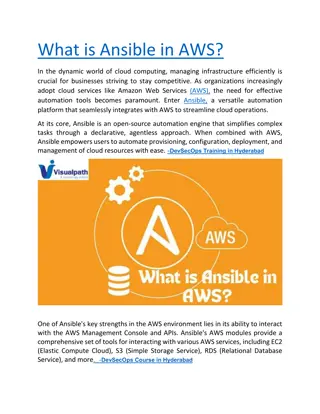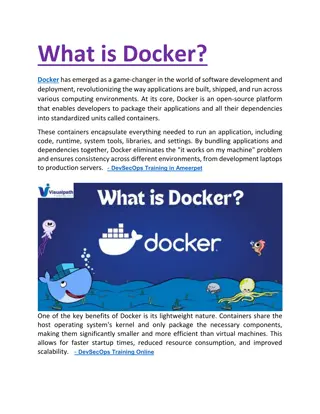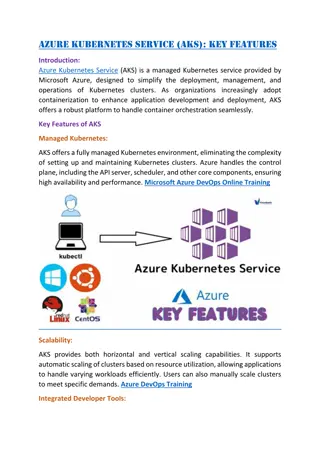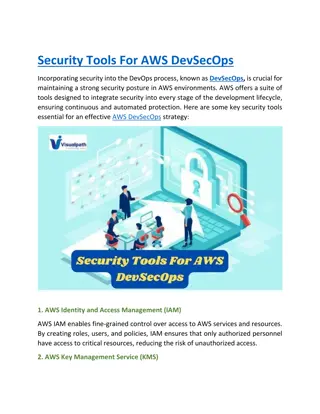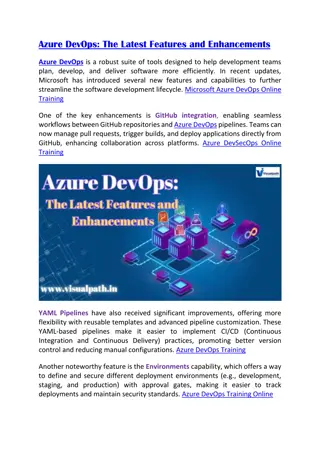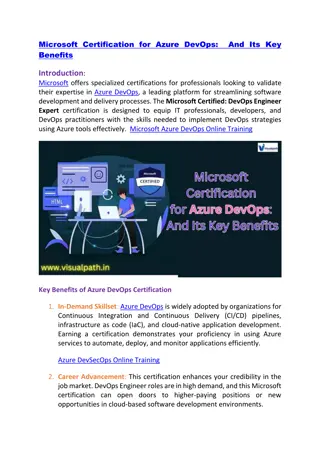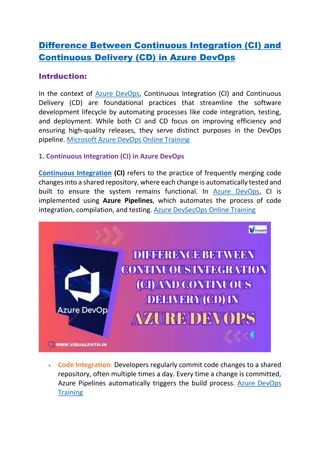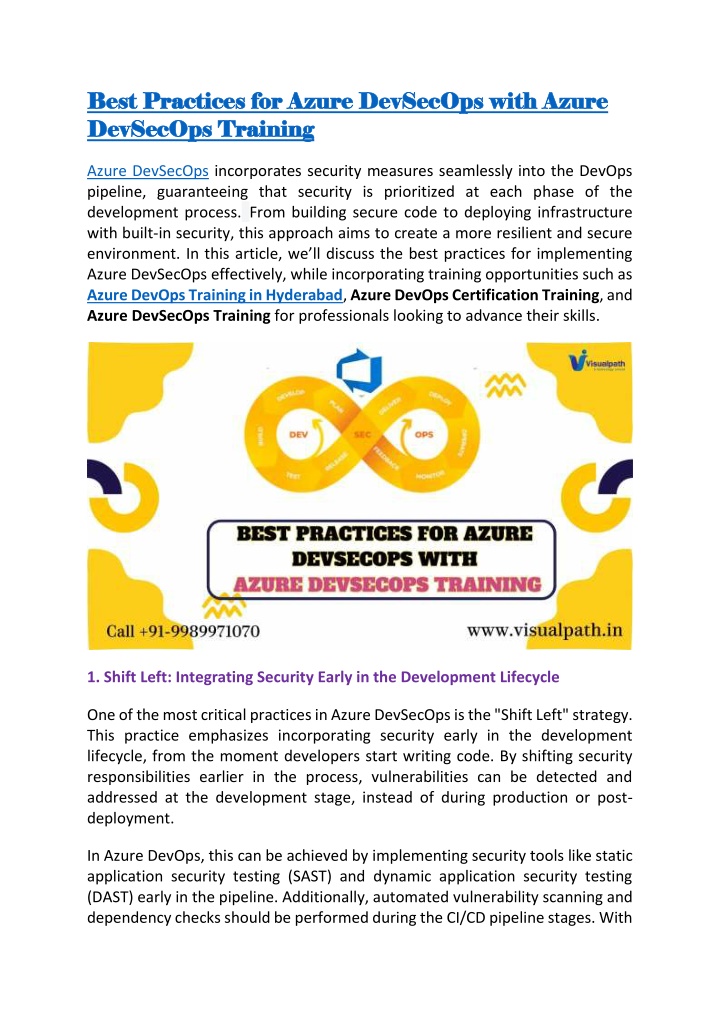
Azure DevSecOps Training | Azure DevOps Certification Course
nVisualpath offers top-rated Azure DevSecOps training worldwide. Our Azure DevOps Certification covers CI/CD pipelines, Git version control, infrastructure as code, and monitoring. The Azure DevSecOps course focuses on security in the DevOps pipeli
Download Presentation

Please find below an Image/Link to download the presentation.
The content on the website is provided AS IS for your information and personal use only. It may not be sold, licensed, or shared on other websites without obtaining consent from the author. If you encounter any issues during the download, it is possible that the publisher has removed the file from their server.
You are allowed to download the files provided on this website for personal or commercial use, subject to the condition that they are used lawfully. All files are the property of their respective owners.
The content on the website is provided AS IS for your information and personal use only. It may not be sold, licensed, or shared on other websites without obtaining consent from the author.
E N D
Presentation Transcript
Best Practices for Azure DevSecOps with Azure Best Practices for Azure DevSecOps with Azure DevSecOps Training DevSecOps Training Azure DevSecOps incorporates security measures seamlessly into the DevOps pipeline, guaranteeing that security is prioritized at each phase of the development process.From building secure code to deploying infrastructure with built-in security, this approach aims to create a more resilient and secure environment. In this article, we ll discuss the best practices for implementing Azure DevSecOps effectively, while incorporating training opportunities such as Azure DevOps Training in Hyderabad, Azure DevOps Certification Training, and Azure DevSecOps Training for professionals looking to advance their skills. 1. Shift Left: Integrating Security Early in the Development Lifecycle One of the most critical practices in Azure DevSecOps is the "Shift Left" strategy. This practice emphasizes incorporating security early in the development lifecycle, from the moment developers start writing code. By shifting security responsibilities earlier in the process, vulnerabilities can be detected and addressed at the development stage, instead of during production or post- deployment. In Azure DevOps, this can be achieved by implementing security tools like static application security testing (SAST) and dynamic application security testing (DAST) early in the pipeline. Additionally, automated vulnerability scanning and dependency checks should be performed during the CI/CD pipeline stages. With
Azure DevOps Certification Course and Azure DevOps Training in Hyderabad, you can learn how to incorporate these security measures into your daily DevOps practices. 2. Automate Security Checks Throughout the CI/CD Pipeline Automation is at the heart of DevOps, and for good reason. With automated security checks integrated into the CI/CD pipeline, teams can continuously monitor code quality and security risks without manual intervention. This practice ensures that security vulnerabilities are detected early, making the process more efficient and reducing human error. In Azure DevSecOps, tools like Azure Security Center, Azure Key Vault, and Azure Defender can be seamlessly integrated into CI/CD pipelines. These tools help automate the identification of vulnerabilities, manage encryption keys, and provide real-time security alerts. By enrolling in Azure DevOps Online Course or Azure DevSecOps Training, professionals can master how to set up these integrations to automate security checks, leading to quicker and safer deployments. 3. Enforce Secure Code Practices and Standards Developers play a vital role in ensuring the security of the applications they build. It is important to set up a secure coding culture where the development team follows best practices for writing secure code. This includes avoiding common vulnerabilities like SQL injection, cross-site scripting (XSS), and insecure direct object references (IDOR). Azure DevOps offers several tools that help enforce secure coding practices, such as integrating code scanning tools (e.g., SonarQube) that detect issues during development. Furthermore, by making security part of the code review process, teams can prevent insecure coding practices from slipping into production. Professionals aiming to learn these best practices can benefit from an Azure DevOps Certification Training program to gain in-depth knowledge on secure coding standards. 4. Continuous Monitoring and Feedback Loops Security does not end once the code is deployed. In Azure DevSecOps, continuous monitoring of applications and infrastructure is critical to ensure that potential vulnerabilities are quickly detected. Azure provides tools like Azure Monitor and Azure Sentinel for real-time monitoring and threat
detection. These tools help track the health of applications, detect anomalies, and provide actionable insights to respond to security incidents immediately. Setting up continuous feedback loops ensures that security issues are identified early and that fixes can be quickly applied. With Microsoft Azure DevOps Training, you can learn to set up these monitoring systems effectively, ensuring continuous improvement and security. 5. Secure Infrastructure as Code (IaC) Infrastructure as Code (IaC) is a key aspect of Azure DevSecOps, as it allows for the automated provisioning of infrastructure. However, IaC must be secure to prevent vulnerabilities in the infrastructure itself. Tools such as Azure Resource Manager (ARM) templates or Terraform can help automate infrastructure deployment, but security policies should be integrated directly into these templates. By using Azure DevOps pipelines, teams can ensure that their infrastructure is automatically deployed with security best practices. Azure DevOps Certification Course and Azure DevOps Online Course provide hands-on training on how to secure infrastructure and automate compliance checks for your cloud-based resources. 6. Role-Based Access Control (RBAC) and Least Privilege Principle In any DevOps environment, controlling access is crucial to prevent unauthorized access to sensitive systems and data. Azure DevSecOps encourages implementing role-based access control (RBAC) to ensure that only authorized users can access particular resources. This is achieved by defining roles within the system and applying the principle of least privilege, where users are granted only the minimum level of access necessary for their tasks. Azure DevOps supports RBAC to manage permissions within projects, repositories, and pipelines, ensuring that team members have the appropriate level of access to perform their roles securely. By taking Azure DevSecOps Training, professionals can learn how to implement RBAC and security policies effectively. Conclusion Adopting Azure DevSecOps best practices is essential for ensuring the security, efficiency, and reliability of your development and deployment processes. By
shifting security to the left, automating security checks, enforcing secure coding standards, and continuously monitoring your applications, you can build a robust and secure DevOps pipeline. Enrolling in Azure DevOps Training in Hyderabad, Azure DevOps Certification Training, or Azure DevSecOps Online Training can help you gain the skills necessary to implement these practices effectively. As more organizations embrace DevSecOps principles, investing in comprehensive training programs like Azure DevOps Certification Course or Azure DevSecOps Training can ensure your success in the evolving world of cloud security. Visualpath is the Best Software Online Training Institute in Hyderabad. Avail complete Microsoft Azure DevOps Training worldwide. You will get the best course at an affordable cost. Attend Free Demo Call on - +91-9989971070 Visit: https://visualpathblogs.com/ WhatsApp: https://www.whatsapp.com/catalog/919989971070 Visit https://www.visualpath.in/online-azure-devops-Training.html








